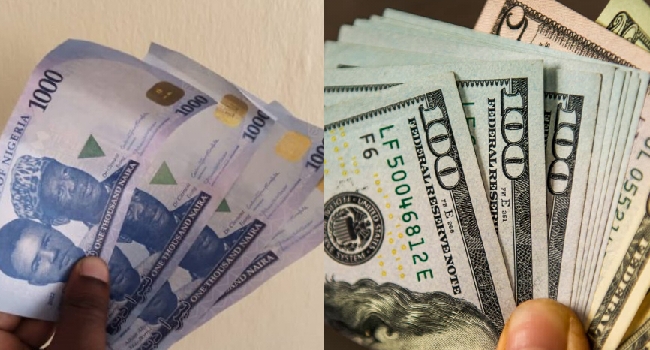Business
REVIEW: Exchange rate rises 4.48% after CBN Naira redesign policy, implications emerge

Four months ago, the Central Bank of Nigeria (CBN) announced that it was redesigning the N200, N500 and N1,000 notes, a move that shocked many Nigerians.
According to the governor of the central bank, Godwin Emefiele, one of the advantages of redesigning the banknotes was that it would increase the value of the Naira.
Emefiele said while he didn’t want to speculate or easily admit that the local currency would gain from the Naira redesign policy, the apex bank head said, “but we suspect that this will happen and that it will positively impact the value of the naira because we don’t want to do any speculation.”
However, four months after, Emefiele’s projection has not been a reality, as the value of the Naira has depreciated in the Investors and Exporters (I&E) window of the official market.
Ripples Nigeria analysis showed that the Naira has plummeted by -4.48 per cent in value since the financial regulator announced on October 26, 2022, that it will redesign the Naira notes.
The cost of buying the United States Dollar (USD) in the CBN-backed foreign exchange window has increased by N19.83 kobo.
A day before the CBN governor announced the Naira policy, the exchange rate in the official market was N441.67 kobo/$1, however, it rose to N461.50 kobo per dollar as of February 10, 2023.
The fall of the Naira in the official market doesn’t come as a surprise to many, as the Institute of Chartered Accountants of Nigeria (ICAN) had stated in December 2022 that the CBN Naira redesign policy would negatively impact the value of the Nigerian currency.
In a publication by its 58th President, Tijjani Isa, it was stated that “the currency redesign policy would potentially negatively affect the exchange rate of the naira.”
Impact of the depreciation in Naira’s value: Naira redesign implications
More Naira notes chasing few Dollars: The Naira redesign policy has led to the scarcity of banknotes in Nigeria, with households and businesses struggling to lay their hands on the local currency.
As a result, many Nigerians are buying the Naira notes at a premium from Point of Sale (PoS) operators, who charge N1,000 or N1,500 for N5,000 withdrawal.
READ ALSO:Naira exchange rate remains unchanged against US dollar
This has increased the number of Naira chasing the USD, as Nigerians have to buy more Naira notes to purchase the American greenback – which is also not readily available – in the official or black market.
Amid this, the exchange rate has also skyrocketed due to traders obtaining the USD in the official market at a cost below N500, but selling at the black market at a price above N700 to profit from the cost of buying the Dollar in the official window.
Cost of operation and goods skyrocket: Due to more Naira notes chasing a few Dollars, the exchange rate has appreciated, and dragged the cost of goods and services along.
Traders pass on the cost of buying the Dollar in the official market to import their goods into the country to their customers.
ICAN had hinted at this, stating, “Businesses and individuals are reported to be searching unsuccessfully to access the US dollar for genuine needs, including the importation of critical raw materials and machinery.
“Even where available, the high exchange rate is already leading to increased cost of production, and hence increase in prices of goods and services.”
More Nigerians to become poor: In response to the hike in the cost of goods, the cost of living has increased, throwing many Nigerians into the poverty basket.
Prior to the Naira redesign policy, the National Bureau of Statistics (NBS) in its 2022 Multidimensional Poverty Index survey, disclosed that 63% of persons living within Nigeria (133 million people) were multidimensionally poor.
The World Bank in its Nigeria Development Update for December 2022 also highlighted the suffering that could ensue from the short transition period of the Naira redesign.
“While periodic currency redesigns are normal internationally and the naira does appear to be due for it, since naira notes have not been redesigned for two decades, the timing of and short transition period for this demonetisation may have negative impacts on economic activity, in particular for the poorest households.
“International experience suggests that rapid demonetizations can generate significant short-term costs, with small-scale businesses, and poor and vulnerable households, potentially being particularly affected due to being liquidity-constrained and heavily reliant on day-to-day cash transactions,” the World Bank said.
Join the conversation
Support Ripples Nigeria, hold up solutions journalism
Balanced, fearless journalism driven by data comes at huge financial costs.
As a media platform, we hold leadership accountable and will not trade the right to press freedom and free speech for a piece of cake.
If you like what we do, and are ready to uphold solutions journalism, kindly donate to the Ripples Nigeria cause.
Your support would help to ensure that citizens and institutions continue to have free access to credible and reliable information for societal development.






















